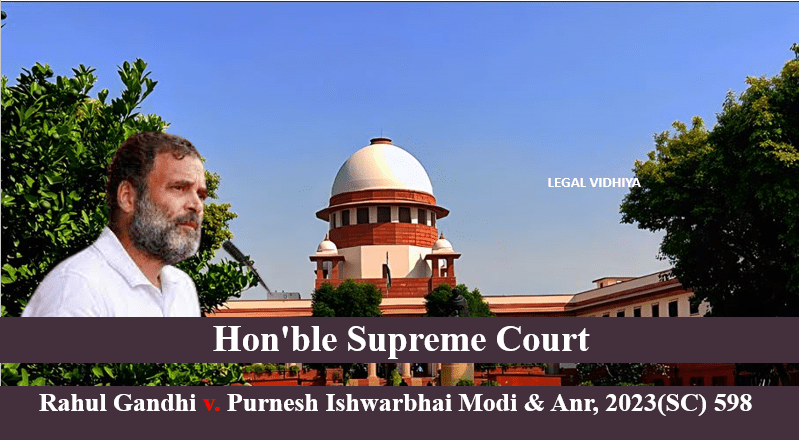
Rahul Gandhi v. Purnesh Ishwarbhai Modi & Anr, 2023(SC) 598
| Citation | 2023 (SC) 598 |
| Date of Judgement | 4th August 2023 |
| Court | Supreme Court of India |
| Case Type | Special Leave Petition (Criminal) No. 8644 of 2023 |
| Appellant | Rahul Gandhi |
| Respondent | Purnesh Ishwar Bhai Modi & Anr. |
| Bench | Justice B.R.Gavai, Justice Pamidighantam Ari Narasimha, Justice Sanjay Kumar |
| Referred | Section 499 and 500 of IPC. |
Facts of the case
The judgment and the order passed by the learned single bench of the High Court dismissing the revision petition, challenged by the present appeal, which was in turn filed challenging the order of the Hon’ble Session Judge thereby they were prayed for the stay of the conviction, which was rejected.
A former Member of Parliament and one of the foremost leaders of the Congress Party Rahul Gandhi while addressing a rally in Karnataka Kolar 2019 has been entangled in a controversial dispute over his verdict that “why all thieves share the same surname”. The appellant is accused of defaming each and everyone who has the surname “Modi.” The MLA of the BJP Party or the former minister of Gujrat Purnesh Bhai Modi filed a complaint against the appellant under sections 499,500 of IPC. After moving out of the stay in the Criminal Defamation Case by the Gujrat High Court in February 2023, he was convicted and got two years jail sentence by the local court of district Surat, of Gujrat. Even though the court of H.H. Varma (Chief Judicial Magistrate) suspended his sentence and granted bail to him for further appeal within the period of 30 days.
Because of the non-suspension of the conviction the very next day, he was disqualified as a Lok Sabha Member as he was representing Kerala’s Wayanad constituency. Article 102 (1) 8 of the Indian Constitution read with section 8 of the Representation of the People Act, 1951 provides that any person who is convicted and sentenced to two years or more imprisonment shall be disqualified or continued to be disqualified for 6 years even after their release.
Issue
- Whether it is justified to give maximum punishment by the learned trial judge to the Appellant?
- Whether it is justified to disqualify the appellant from the membership of the Parliament?
- Whether Criminal Defamation is an offense involving moral turpitude?
Arguments
A Senior Advocate Abhishek Manu Singhvi appeared from the side of the appellant and submitted that a complainant Purnesh Modi who is the former MLA Of Bhartiya Janta Party belonged to the Modh Vanika Samaj. The records indicate that the Modi surname is prevalent under many other casts and not only in Modh Vanika Samaj. He clearly pointed out that there are more than 13 crore members in the Modi community but only some members of the BJP have complained about the allegation of criminal defamation. He argued that the class of people having the surname Modi is not a conspicuous class according to sections 499 and 500 of the IPC which can file a complaint of defamation.
The issue of awarding a maximum sentence to the appellant is highly unusual and exceptional as it is not a crime for which a maximum sentence should be given. And how can this offense become an offense which involves moral turpitude? Singhvi stated that the appellant did not get any conviction in any case before. He is not even a criminal. It is very important for us to have mutual respect among politicians. Mr Jethmalani from the side of the complainant said that a person who has a history of talking about any kind of rash speech such a man has no right to ask for any concessions. They could not give any remorse in the present case.
Court Observed
Along with the conviction of appellant Rahul Gandhi the Supreme Court also stayed the sentence awarded. The Supreme Court further said that apart from the admonition given by the court in the contempt proceeding, no other reason has been given by the trial judge when he was imposing the sentence of two years. It is also worth noting that when the learned trial judge imposed the sentence of two years only then the provisions of section 8(3) of the Representation of Peoples Act came into light. If this sentence was a day less than this provision would not have existed
at all. Hence along with the ban on conviction, the disqualification as a Member of Parliament has also been adjourned.
Decision
Leave granted. And it is clarified that if there are any further proceedings with this appeal in Appellant Court, the pendency of the present appeal would not come in the way.
References
This Article is written by Vipasha Mehta of H.N.B.G.U. Uttarakhand, Intern at Legal Vidhiya.




0 Comments